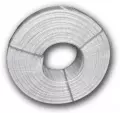mineral
A mineral or mineral is a substance (element or chemical compound) that[1]:
it is crystalline under normal conditions
it occurs naturally in nature
has a homogeneous chemical composition (however, it can vary within certain limits) and homogeneous physical properties in any part (homogeneous structure even at the microscopic level); of course, the presence of growths and other defects in the mineral is not excluded
As a rule, it is also stated that the mineral must be inorganic (non-structural in Slovak), but although the vast majority of minerals are inorganic, there are also a few organic (structural) minerals. In addition, it is sometimes stated that it can be of any state, so this includes gases such as carbon dioxide or hydrogen sulfide. Furthermore, it is sometimes stated that they must have been created through geological processes (that is, on Earth), but today substances from other cosmic bodies (Mars, the Moon, meteorites) are also considered minerals. Minerals are the material that all rocks are made of[2].
There are several substances often considered minerals, although they violate the above definition, such as:
two liquid substances: mercury and liquid water (sometimes liquid water, unlike ice, is not classified as a mineral)
mineraloids, i.e. amorphous inorganic (in Slovak, formless, incoherent) substances without a crystal structure, which otherwise meet the definition of a mineral (opal, obsidian); amorphous minerals usually form spherical or grape-shaped formations
biogenic (that is, contained in living systems) materials, if geological processes (e.g. guano minerals) took part in their formation.
Conversely, the following are not considered minerals:
atmospheric gases etc. (however, these are sometimes considered minerals, see above)
oil and non-crystalline bituminous substances, e.g. coal, but these are often considered minerals as well
anthropogenic (man-made) materials, anthropogenic materials modified by geological processes,
substances created by human intervention in nature (e.g. products of the burning of coal heaps), but on the contrary, we consider substances created by the transformation of the material of mine heaps, on the walls of mining works, etc. to be minerals.
biogenic materials, if they are not modified by geological processes (gallstones, mollusk shells, etc.),
mixtures of minerals (rocks)
rocks, which are usually mechanical mixtures of various minerals (e.g. granite consists of quartz, feldspars, mica and other minerals). The exception is monomineralic rocks, which are made up of only one mineral (e.g. marble consists only of calcite grains).
As you can see, the definitions differ slightly, but the important thing is always that the mineral was created by natural forces without human intervention.
The chemical composition of a mineral can be expressed by a chemical symbol or a chemical formula. The science of minerals is mineralogy, in older literature also mineralogy.























































































































































